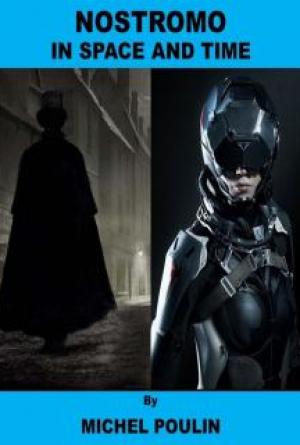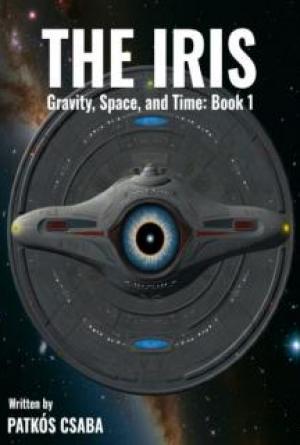Chapter 18
______CAHUITA
ON THE PLANET CAHUITA, unreckonable years before this story opens, an entity brooded.
This entity, Medury by symbol, was not even vaguely man-like; in fact, he—the third person singular pronoun, masculine, is used very loosely indeed; but since it is somewhat better than either “it” or “she” it will have to do—was not even vaguely corporeal or substantial.
Man’s earliest ancestor, it is believed, came into being through the interaction of energy and matter in the waters of the infant seas of Earth. The first Cahuitans, however, originated in the unimaginably violent, raw, crude energy-flare of an atomic explosion.
This explosion did not take place on Tellus, nor in any time known to Tellurian history. The place of occurrence was a planet in the spiral arm of the galaxy across the tremendous gulf of empty space which we now call Rift Two Hundred Forty; the time, as has been said, was in the unthinkably remote past.
Cahuitans are not, strictly speaking, immortal; but as far as mankind is concerned, and except for exceedingly peculiar violences, they might as well be.
Medury brooded. His problem was old; it had probably been considered, academically, by every Cahuitan then alive. But only academically, and no Cahuitan had ever solved it, for the philosophy of the race had always been (and still is) the simple one of least action—no Cahuitan ever did any job until it became necessary; but, conversely, once any job was done it was done as nearly as possible for all time to come.
Medury was the first Cahuitan to be compelled, by one of the basic urges of life, to deal with the problem as a concrete, not an abstract, thing. The problem was, therefore, his. His alone.
His world, the only planet of its sun, was old, old. The last atoms of its fissionables had been fissioned; the last atoms of its fusibles had been fused; no more fires could be kindled.
The Cahuitans in general did not care. For the adolescents, the time of need for a source of high-level quanta had not yet come. For those already fulfilledA it had passed. While entirely gaseous, the planet would stay comfortably warm for a long time. Its energies, with the outpourings of its parent sun, would feed billions of people instead of the mere hundreds of thousands comprising its present population. JobsA, businessesA, commerceA, and industryA went on as usual, unaffected.
But Medury was affected: basically, fundamentally affected. The time had come when he should progress into completion, and without a new fire the Change was impossible.
For a time which to a human race would have been fantastically long Medury brooded, considering every aspect of the problem; then stirred himself to action. Converting a tiny portion of his non-material being into three filaments of energy, he constructed a working platform by attaching the ends of these three filaments to the cores of three widely-separated suns. Thus assured of orientation, he launched into space a probing needle of pure force; a needle which, propagated in and through the sub-ether, covered parsecs of distances in microseconds of time. And thus for days, years, what might have been centuries and millennia as we of Tellus know time he searched; and finally, he found.
Pulling in all his extensions, he shot a tight beam to a fellow-being, Litosa by symbol, and tuned his mind precisely to hers. (“Hers” being perhaps a trifle better than either “his” or “its”.)
“For some little time you too have felt the need of fulfillment,” he informed his proposed complement in level, passionless thought. “You and I match well; there being no duplications, no incompatibles, no antagonistics in our twelve basics. Our fulfillment, Medosalitury, and our products, Midora and Letusy, would all three be super-primes.”
“Yes.” What a freight of rebellion against fate was carried by that monosyllable! “But why discuss it? Why reach for the unattainable? From now on we die—we all die—unfulfilled and without product. All life in this universe—in this galaxy, at least—ends with us now here.”
“I hope not. I think not. There are many solar systems. . . .”
“To what end?” Litosa broke in, her thought a sneer. “Can you kindle utterly frigid fuel? Can you work in a sun’s core? Or can you, perhaps, take a piece of star-core stuff through empty space to a cold planet and. . . .” The thought changed in tone, became what would have been on Earth a schoolgirl’s squeal of rapture:
“You CAN! Or you wouldn’t have brought up such a harrowing subject. You REALLY CAN!”
“Not that, exactly, but something just as good. I found sparks and kindling on a cold, solid planet.”
“NO!” The thought was ecstasy. “You DIDN’T!”
“I did. Whenever you’re ready, we’ll go.”
“I’ve been ready for CYCLES!”
The two beings linked themselves together in some fashion unknowable to man and shot away through the airless, heatless void. Heatless, but by no means devoid of energy; the travelers could draw sustenance enough for their ordinary needs from the cosmic radiation pervading all space.
Across Rift Two Hundred Forty they flew and on through interstellar space. They reached our solar system. On the third planet, our Earth, they found several atomic power plants. There were no loose atomic vortices—then.
“Hold on! Wait!” Litosa exclaimed, and the strangely-linked pair stopped just short of the glowing bit of warmth—the ragingly incandescent, furiously radiating reactor in the heart of one of Earth’s largest generating stations—which was its goal. “There’s something funny about this. How could there possibly be even one little spark like this, to say nothing of so many, on such an utterly frigid planet, unless some intelligent being started it and is maintaining it for some purpose? There MUST be intelligence on this planet and we must be intruding shamefully. Have you scanned? Scanned. CAREFULLY?”
“I have scanned. Carefully, completely. Not only on this planet’s surface, but throughout its depths. I have scanned, area by area and volume by volume, this sun and its every planet, satellite, and asteroid. There is no intelligence here. More, there is no sign whatever of any kind of life, however rudimentary, latent, or nascent. I have been able to find nothing whatever to modify our conclusion of long and long ago that we are the only life, intelligent or otherwise, in existence. Scan for yourself.”
Litosa scanned. She scanned the sun, the planets, the moons and moonlets, the asteroids down to grains of sand and particles of dust. Still unsatisfied, she scanned all neighboring solar systems, from Centralia to Salvador. Then, and only then, did she accept Medury’s almost unacceptable conclusion that these providential sparks were in fact accidental and were in fact, by some process as yet unknown to Cahuitan science, self-balancing and self-sustaining.
Medury and Litosa, woven into a fantastically intricate and complex sphere of ultra-microscopic filaments, flashed into the heart of the reactor, which thereupon went instantaneously and enthusiastically out of control.
And from the pleasant warmth of the incubator-womb—to us of Earth the ravening fury of the first loose atomic vortex—there emerged the fulfillment Medosalitury. This entity, grave and complete and serene as an adult Cahuitan should be, wafted itself (there is no question as to which pronoun is to be used here) sedately back to its home planet.
And in the pleasant warmth of that same incubator-womb the two products, Midora and Letusy, began very slowly to gestate.
* * * * *
Joan and Storm, minds in fusion, set out to regions never before explored by man. Downward first. One cycle per second. One per minute. One per hour; per day; per year; per century. . . .
“Hold everything, Storm! You’re getting out beyond my depth. Anyway, what use are they in what we’re after?”
“None at all, that I can see; but it’s new knowledge. Nobody ever dreamed—correction, please: nobody ever published—anything about it, or I’d’ve heard of it. Maybe the Fives know all about it, though; I’ll check with them, first chance I get. QX, we’ll jump up to the radio band.”
“There wouldn’t be any radio waves out here, and you couldn’t understand the language if there were.”
“How do you know? We’ll go where there are some and find out. Maybe we can understand any kind of language now—maybe that’s one of the natural abilities of a Type Three-Six fusion. Who knows?”
In an instant they were receiving a short-wave broadcast at the Heaviside Layer of a distant planet. They could receive it, could de-louse it, could separate signal from carrier wave, could read the information; but they could not understand it.
“Well, that’s a relief,” Joan sighed. “I was getting more than half afraid that a Type Six mind would be omniscient.”
“If I’m a Six you needn’t worry; there’s altogether too much to know. Where do you want to go from here?”
“Let’s look at the infra-red and the ultra-violet. I’ve often wondered what colors they would be.”
The fusion looked, and saw things that made both participants gasp. That is, they did not really see, either. None of the six ordinary senses—of perception, sight, hearing, taste, smell, or touch—were involved. Or rather, perhaps, all of them were involved, or merged with or into some other, brand-new sense possessed only by high-type minds in full action.
“As a semanticist, Joan, can you write a paper on that? That would make any kind of sense, I mean?”
“I’ll say I can’t,” Joan breathed. “Especially as a semanticist, I can’t. No words, no symbology, in any language. But weren’t they beautiful, Storm? And wonderful, and . . . and awful?”
“All of that. I’d like to write it up, or make a tri-di of it . . . or something . . . but of course we can’t. What next? Shall we flirt a bit with the cosmics and ultras, or had we better jump right into the channels of thought?”
“Thought, by all means; the more practise we get, the better, and they’d be on a terrifically high band, don’t you think?”
“Bound to be. The logical conclusion of this whole fantastically cockeyed set-up is that they’ve simply never even suspected that we exist; any more than we have that they do.”
“Would the . . . the bodies, if I can call them that, radiate of themselves, or just thoughts?”
“Not of themselves, I don’t think . . . no. An entity of pure energy would have to be held together by forces of magnitudes we can’t even guess at; much too intense to permit bodily radiation. Something like the binding energies of particles, I imagine; but different and very probably even more so.”
The fusion leaped then to the bands of thought. It sought out and seized the thoughts of various of the ship’s personnel; gripping, molding, working, analyzing. Joan and Cloud were not reading minds now, at all; they were studying the fundamental mechanisms of the thoughts themselves. How they were generated; upon what, if anything, they were heterodyned; how they were transmitted; and, above all, exactly how they were received and exactly how they were converted from pure thought, couched at least in part in the symbols of language, into usefully assimilable information.
And, such was the power of that fusion, it succeeded.
Then up and up and up the scale of thought the fused minds went; seeking, finding, mastering. And up and up and up, into regions where no thoughts at all were to be found. And up and up, and up. . . .
“Stop it! Let me go! I’m burning out!” Joan shrieked aloud. “My God, Storm, is there no limit at all to your ceiling?”
Cloud stopped; loosed her mind. “I’m sorry, chick, but I was just getting nicely organized. We’ve got a long ways to go yet, I’m afraid.”
“I’m sorry, too, Storm, sorrier than you’ll ever know, but I simply can’t take it. Three seconds more of that and I’d’ve gone stark, raving mad. And when we get to Cahuita I don’t know what I’ll do. I may blow up completely.”
“You may think so, but you won’t. You’re not the type. And we aren’t going to Cahuita—at least, not in the flesh. When we hit that band we’ll be there automatically.”
“Not quite automatically, of course, but we’ll be there, yes. I want to stay with you, more than I ever wanted anything before in my whole life, and I want to help you . . . couldn’t we loosen the fusion just a little, so that I can pull away when the going gets too rough for me? Just enough to keep away from a burnout, but close enough to see and perhaps to help a little?”
“I don’t know why not . . . sure, like this.” He showed her.
Again the fusion went up and up and up, and this time it did not stop at Joan’s ceiling. She pulled away a little, but not enough so that she could not sense and understand, in a way, what was going on.
Cloud, every muscle set and eyes closed tight, sat in a chair, his hands gripping fiercely its arms. Joan lay face down upon a davenport, her face buried in a pillow, her fists tight-clenched.
And the linked minds—linked now, not fused—went up . . . and up . . . and up. . . .
And, finally, they reached the band upon which a Cahuitan fulfillment was thinking.
It would probably be too much to say that the fulfillment was surprised. An adult, fulfilled Cahuitan is so serene, so sedate, so inherently stable at any possible level of stress, that it is probably impossible for it to feel any such sensation or emotion as surprise, even at the instantaneous unveiling of a whole new universe of thought. It was, however, in a calm, passionless, and scholarly way, interested. Not what could be called intensely interested, perhaps, but really interested, nevertheless.
As had been foreseen, the modes of thought of the Cahuitan and the linked Tellurians were different indeed. As has been shown, however, there were some points—the fulfillment could remember the emotions of its component products, even though it could no longer feel them—upon which even such divergent minds as those could find common ground. Also, it must be borne in mind that the Cahuitan was an able and seasoned thinker, trained for many millennia in the art, and that Neal Cloud was a Type Six mind; the only such mind then to be found in all Civilization. Hence, while it would serve no useful purpose here to go into detail as to how it was accomplished, a working understanding was at last attained.
Cloud came to understand, as well as any being of material substance ever could, the beings of pure energy. The Cahuitan learned, and broadcast, that intelligent life could and did exist in intimate association with ultimately frigid matter. While the probability was small that there would ever be any considerable amount of fruitful intercourse between the two kinds of life, some live-and-let-live arrangement should be and would be worked out. There were thousands, yes, millions, of planets absolutely useless to anybody or anything known to man; planets harboring no life of any kind. The Patrol would be glad to set up, on any desired number of these barren planets, as many atomic power plants as the Cahuitans wanted; with controls set either to let go in an hour or to maintain stability for twenty five thousand Galactic Standard years.
The Cahuitans would immediately extinguish all vortices not containing products, and would move all living products to the new planets as soon as the promised incubators were ready.
“Products indeed—they’re babies!” Joan insisted, when Cloud stepped the information down to her level. “And how can they possibly move them?”
“Easily enough,” the fulfillment told Cloud. “Blankets of force will retain the warmth necessary for such short trips, provided each new incubator is waiting, warm, and ready.”
“I see. But there’s one question I want to ask for myself,” and Cloud went on to explain about the unbelievably huge sphere that crossed Civilization’s vast expanse of space. “What’s the reason for it?”
“To save time and effort. The product Medury devoted much of both to the evaluation of a sufficiently productive, esthetically satisfying, and mathematically correct construction. It would not be logical to waste time and labor in seeking a variant or an alternate, especially since Medury’s work showed, almost conclusively, that his was in fact the most symmetrical construction possible. Now symmetry, to us, is what you might, perhaps, call a ruling passion in one of your own races.”
“Symmetry? The first twelve vortices were symmetrical, of course, but from there on—nothing.”
“Ah—that is due to the differences between our thinkings; particularly in our mathematical and philosophical thinkings. The circle, the sphere, the square, the cube—all such elementary forms—are common to both but the likenesses are few. The differences are many; so many that it will require several thousands of your Galactic Standard years for certain of my fellows and me to tabulate them and to make whatever may be possible of reconciliation.”
“Well . . . thanks. One more question . . . maybe I shouldn’t ask it, but . . . this that we have laid out is a wide-reaching and extremely important program. Are you sure that you are able to speak for all the Cahuitans who will be affected?”
“I am sure. Since we are a logical race we all think alike—logically. On the other hand, your race does not seem to me at the moment to be at all a logical one. Can you speak for it?”
“In this matter I can; and you, in my mind, will know that I can,” and in this case Cloud could indeed speak for the Patrol. Philip Strong, after one glance in Cloud’s mind, would issue the necessary orders himself and would explain later—to anyone capable of accepting the true explanation.
“Very well. We will destroy the empty incubators at once, and will go ahead with the rest of the project whenever you are ready.”
The Cahuitan broke contact and vanished.
In the ship, Cloud got up. So did Joan. Without exchanging a word or a thought they went hungrily into each other’s arms.
After a time, and still keeping one arm around his Joan, Cloud reached out and punched a button on his intercom.
“Captain Ross?”
“Ross speaking.”
“Cloud. Mission accomplished. Return to Tellus, please, at full touring blast.”
“Very well, sir.”
And “Storm” Cloud, Vortex Blaster, was out of a job.
A The reader will please understand that I am doing the best I can with words we all know. E.E.S.







